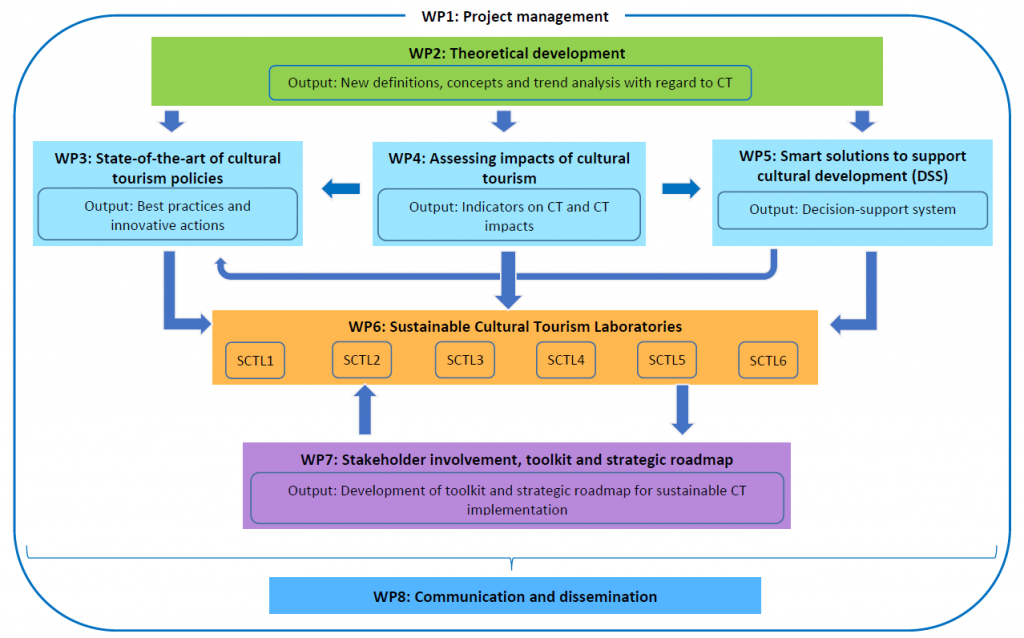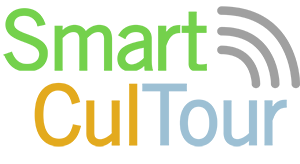Work Packages

WP1: Project management and consortium coordination
Work package 1 relates to the smooth and continuous collaboration between the partners. The WP will:
- Ensure the correct execution of all WP, including the achievement of objectives and milestones;
- Organize timely meetings between partners;
- Ensure correct administrative and financial management and timely reporting to the EC.
WP2: Theoretical development
Work Package 2 aims to provide a solid literature review related to cultural tourism and cultural tourist destinations. It aims to go beyond current conceptualizations of cultural tourism and associated sector. The WP will:
- Provide an interdisciplinary view on defining the concept of cultural tourism and the various definitions used in literature;
- Elaborate on the definition of cultural tourism and cultural tourism destinations and interplay between them;
- Identify the factors, including resilience and sustainability, that influence sustainable cultural tourism in urban and regional destinations;
- Identify the role of governance of cultural tourism;
- Explore the future of cultural tourism for urban and regional destinations;
- Provide a set of indicators for sustainable cultural tourism.
WP3: State-of-the-art of cultural tourism policies
The aim of Work Package 3 is to provide a description of the state-of-the-art of cultural tourism interventions implemented in European cities and regions, thereby identifying best practices, factors conditioning the success of cultural tourism interventions, insights gained from interventions that have been less successful. In practice this entails:
- Creating a taxonomy of different types of cultural tourism interventions;
- Identifying, for each type of cultural tourism intervention, several best practices and interesting cases from European cities and regions. A best-practice cultural tourism policy is seen as one that successfully contributes to sustainable urban and regional development and resilience. In addition, we also identify regions and cities that offer examples of best practices in measuring the impacts of cultural tourism (interventions);
- Assessing the sustainability and effectiveness of interventions. We will identify, using secondary sources, the expected, perceived and/or measured impacts of the cultural tourism interventions on sustainable urban and regional development and resilience;
- For all best practices we will determine conditions for success. For this we will look into the local context, governance structures (arenas and processes for decision-making, as well as implementation structures), and the relevant stakeholders and their interests;
- For the less successful interventions, we will identify possible elements and aspects that prevented the intervention to achieve better results, in terms of perceived and/or measured impacts on sustainable urban and regional development and resilience;
- Create a framework that shows the different types of cultural tourism interventions, their impacts and conditions for success.
WP4: Assessing the impacts of cultural tourism
Work package 4 aims to identify/create a framework of indicators, with appropriate parameters, that can be used to measure the impacts of cultural tourism of a cultural tourism destination’s sustainability and resilience, taking into account its position in the TALC. The framework will be applied in the Labs and, in doing so, made context-specific.
This work package has two objectives. The first is aimed at extending knowledge on:
- Indicators to measure a cultural tourism destination’s sustainability;
- Impacts of cultural tourism development on a cultural tourism destination’s sustainability;
- Indicators to measure a cultural tourism destination’s resilience;
- The impacts of cultural tourism development on a cultural tourism destination’s resilience;
- The relationship between the sustainability and resilience of a cultural tourism destination and the TALC.
The second objective is aimed at:
- Delivering a Sustainability/Resilience/TALC (SRT) framework of indicators;
- Applying the framework in each Lab and developing context-specific SRT frameworks for each.
In WP 4 we aim to identify/create a framework of indicators, with appropriate parameters, that can be used to measure the impacts of cultural tourism of a cultural tourism destination’s sustainability and resilience, taking into account its position in the TALC. The framework will be applied in the Labs and, in doing so, made context-specific.
WP5: Smart solutions to support cultural development: the SmartCulTour DSS
Work package 5 aims at the design and implementation of a DSS that will allow for a systematic exploitation of the set of indicators (WP4), information and data collected during the project and further obtained by using big data analysis techniques and open source information networks. The objective of the DSS – labelled the SmartCulTour Platform – is to create «additional information value», to support strategic decision making in the field of cultural tourism development. It will be equipped with an online computerized interface. Via the interface the SmartCulTour Platform will support stakeholders to design potential interventions in cultural tourism, based on critical success factors (WP3) such as the current interventions, the type of stakeholders involved, the specific context of the city, region or destination and its position in the TALC. The SmartCulTour Platform will be adopted by each Lab, ensuring an in-depth analysis of the dynamics of cultural tourism. The virtuous mechanisms of interpretation lead to information that support the co-creation of services that can be offered to residents, visitors, managers and policy makers. Based on these applications, methodological guidelines will be developed to guarantee the widest applicability and replicability of the SmartCulTour Platform.
The SmartCulTour Platform will:
- Deliver a knowledge platformof official cultural tourism data, outlining existing supply and demand, growth trends and strengths and weaknesses of all European nations, at national and international level (the basic layer);
- Contain an integrative cognitive layer (second layer). The SmartCulTour Platform will be enriched with e.g. mobile phone data (PS data recorded by telephone antennas) and data from credit card transactions (e.g. Mastercard or Visa). This creates the possibility for an in-depth analysis of the cultural tourists’ behaviour (mobility, motivation of the visit, attraction of certain places, but also purchasing behaviour). The SmartCulTour Platform will also allow for the integration of data from social media (data left independently by users of social networks, blogs, review sites, etc.), small data analysis and field surveys, and thereby be able to describe the experience of users, both citizens and tourists;
- Re-elaboration the data, through systems of artificial intelligence and business intelligence (third layer), if possible through a prototype of a machine learning macro, providing public administrations and stakeholders with useful information to support decision making. This is based on: 1. data integration; 2. forecasting future trends and dynamics; 3. clustering of regions/destinations in terms of similar characteristics and subsequent benchmarking
WP6: Sustainable cultural tourism laboratories (SCTL)
Work Package 6 establishes six Living Labs, that are chosen on the basis of geographic and typological coverage. The objectives of the labs are to set up a community of practice and create a bi-directional flow of information between multi-actor communities, develop capacities, identify successful practices and provide input and feedback, as well as testing and trialing the SRT framework (WP4), the SmartCulTour Game (WP7) and the SmartCulTour Platform (WP5). Specifically, the Labs will:
- Provide a structure and design protocols to engage multiple stakeholders, representing different perspectives and interests;
- Raise awareness and develop capacities of stakeholders for the implementation of relevant international standards, using methodologies and tools developed within the framework of UNESCO;
- Assist the co-creation of the context-specific SRT frameworks, the SmartCulTour Game and Platform, through dialogue, reflection and learning;
- Provide, discuss and evaluate the state-of-the-art (WP3);
- Remove major barriers for the uptake of potentially successful cultural tourism interventions;
- Measure the effects of cultural tourism and cultural tourism interventions on sustainability and resilience, via the SRT framework.
WP7: Providing policy-makers and practitioners with the service design tools and strategic roadmap for cultural tourism change in Europe
Work Package 7 aims at creating a Toolkit for cultural tourism change. Based on the principles of participatory service design, arts-based methods and the SmartCulTour game, that will enhance empathy between stakeholders and stimulate dialogue and engagement, the objective of this WP is to enhance ongoing strategic development within the cultural tourism regions in Europe.
WP8: Dissemination, communication and project “afterlife” strategy
The main aim of Work Package 8 is to disseminate the knowledge and results generated by the project to key target audiences and sectors timely and effectively, to enhance end-user and community participation in the project through active social media engagement, to promote the sustainability and “afterlife” of the tools developed during the project and to raise awareness about the importance of sustainable cultural tourism.
More specifically, WP8 will:
- Raise awareness and disseminate information on the tools (SmartCulTour Game, Platform, Toolkit and Manual), best practice interventions, results and activities of the project;
- Engage local communities and tourists through an active social media plan, encouraging participation, feedback and involvement in the Labs and the project´s activities;
- Raise wider awareness among policy-makers, other stakeholders and the wider public about the positive impact on urban and rural development of sustainable cultural tourism;
- Set out a strategic “afterlife” continuation plan so that the knowledge, tools and practices developed during the project are made available and taken up by key tourism stakeholders after the end of the project.


